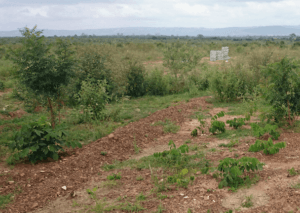Ghana Boundary Commission inspects boundary demarcation at Paga
 The Ghana Boundary Commission (GhBC) and its counterpart in Burkina Faso have inspected international boundary pillars at Paga, Upper East Region, for first-hand observation on boundary line encroachments.
The Ghana Boundary Commission (GhBC) and its counterpart in Burkina Faso have inspected international boundary pillars at Paga, Upper East Region, for first-hand observation on boundary line encroachments.
The visit afforded officials from the two countries the opportunity to brainstorm on how to address the issue of encroachments to prevent any possible boundary problems between the two countries.
At a joint meeting at Paga, prior to the visit, Major General Dr Emmanuel Kotia, the Chief Executive Officer (CEO) of the GhBC, said the Commission was responsible for the demarcation and delimitation of land and maritime boundaries.
He said following several encroachments at the Paga-Burkina Faso border, the Commission took it upon itself to brainstorm with its counterpart from Burkina Faso on how to solve the issue.
“The problem is that all the buffer zone areas have been encroached and we have built up areas surrounding the boundary pillars which are against international law. So, this is very fundamental, and we need to see how best we can resolve it.
“As a result of that, we invited our Burkinabe counterparts to come and then we have a first-hand observation. We will walk through and see practically what is happening, and we will be able to see how we could mitigate that problem,” he said.
He said Burkina Faso had managed to move its border line forward to cover the gap that was created.
“So, there is also the need for us to brainstorm to see how Ghana can also close up that gap so that, we do not open that space for criminals and any unforeseen circumstances in between that gap,” he said.
The CEO noted that any issue on boundaries must be discussed between the countries involved, saying “That is the more important reason the Burkina Faso Boundary Commission is here.”
Colonel Henry Kwaku Badasu, the Director of Operations, GhBC, indicated that the boundary between Ghana and Burkina Faso was approximately 590 kilometres with 287 kilometres of the boundary being river bodies and 303 being land boundary.
“It actually stretches from the Senkase River boundary in the Pusiga District, continuous with land boundary and runs all the way to the Bole District in the Savannah Region, where the boundary with Burkina Faso ends,” he explained.
The Burkina Faso team, led by Madam Salimata Dabal, the Permanent Secretary of the National Boundary Borders of Burkina Faso, on her part, said efforts had been made over the years to reaffirm the boundary between Ghana and Burkina Faso.
She said some of the boundary pillars were destroyed and residents from both countries at the border encroached on the border line, “Once we agree to discuss the issue, we will definitely find solution to the problem.”
Madam Dabal commended the GhBC for involving them in the process, noting that “This shows the importance of Boundary Commissions in Ghana and Burkina Faso.”
Mr Laud Ofori Afrifa, the Deputy Comptroller General, Ghana Immigration Service, said the Service was the first line security along the borders and that owners of temporal structures on the Ghana side of the border which directly faced the Burkinabe border post would be destroyed to enable them to create a temporal post opposite their counterpart.
Mr Boniface Gambila, Ghana’s Ambassador to Burkina Faso, said there was the need for peaceful coexistence between Ghana and Burkina Faso with the boundary line dividing the two countries.
“When we obey the boundary lines, there is peace and harmony. There is international cooperation and bond. So, the bond between us is what we are trying to maintain.
Source: GNA
